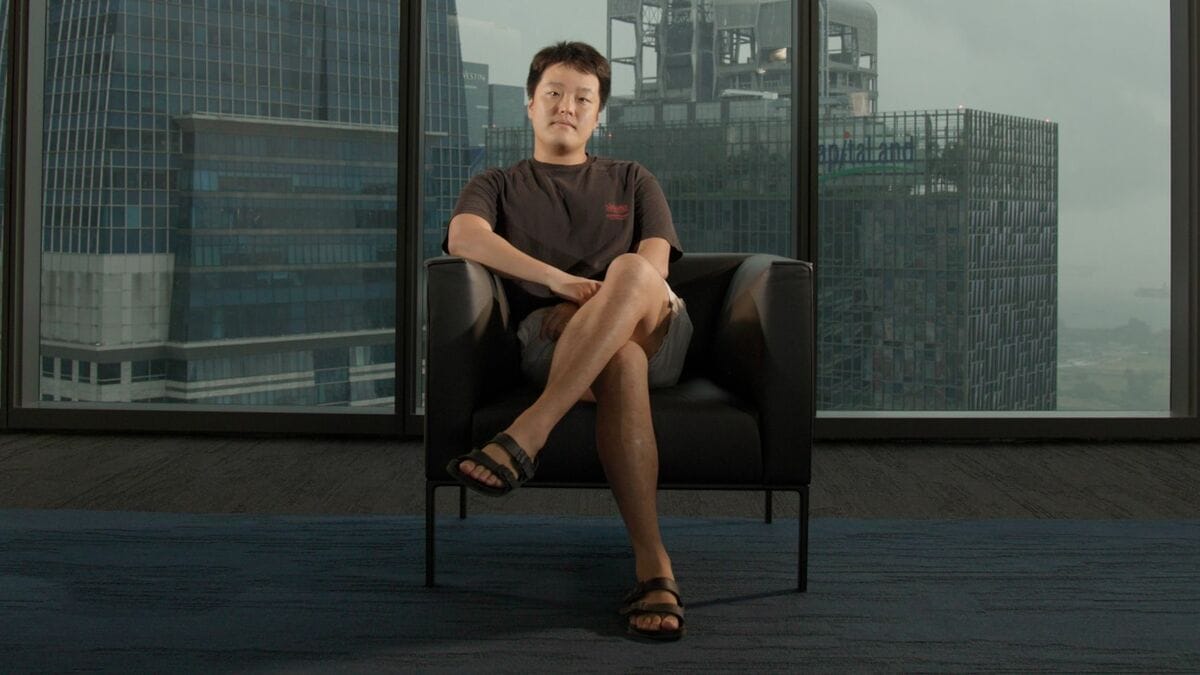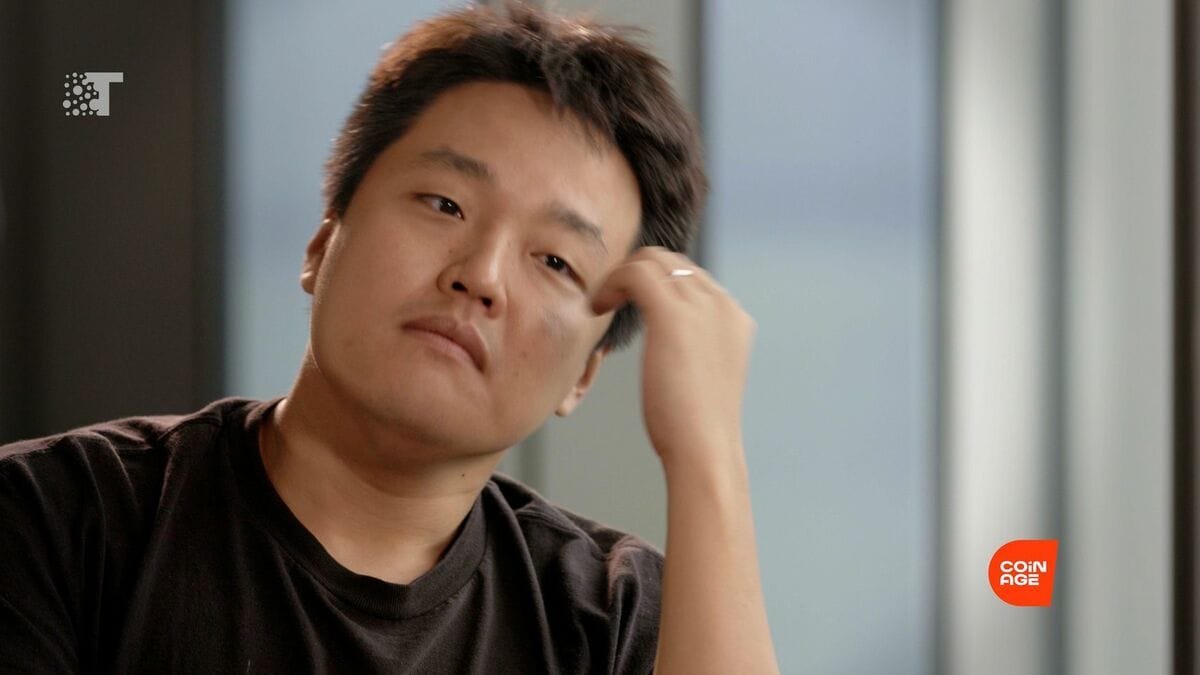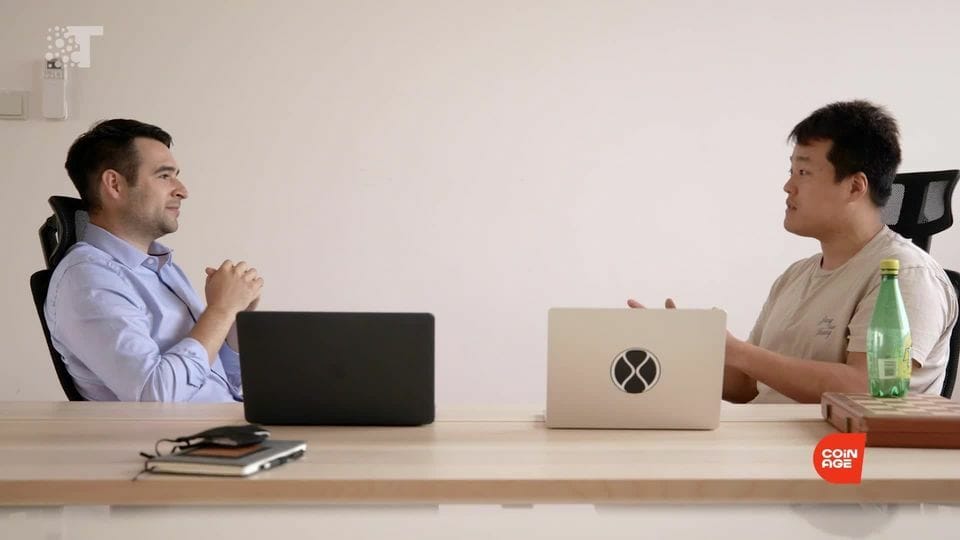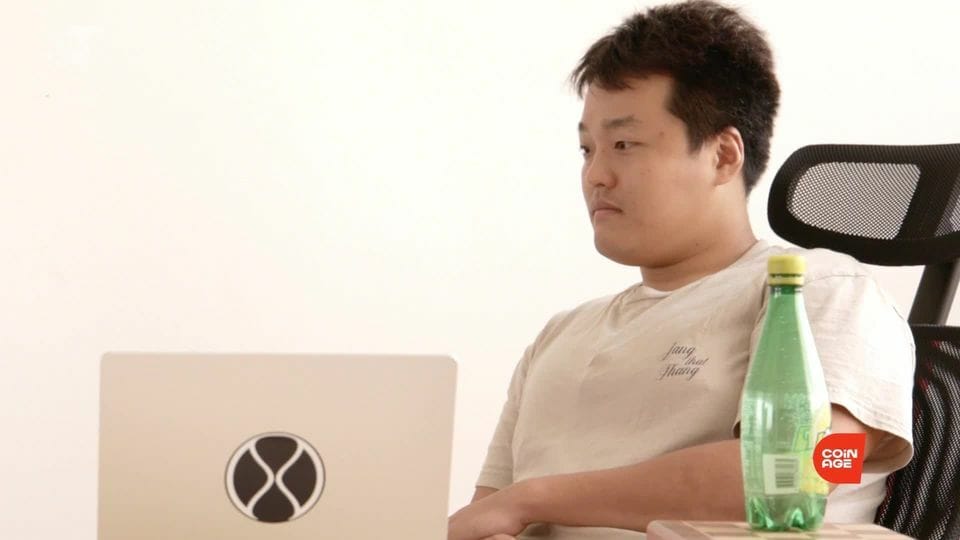- Crypto Uncomplicated
- Posts
- Do Kwon's explanation for Terra's collapse is a tough pill for crypto to swallow
Do Kwon's explanation for Terra's collapse is a tough pill for crypto to swallow
If it's all about "community," what does "community" really mean?

Crypto Uncomplicated is a free crypto newsletter distilling all the happenings in the crypto space. Unlock the full experience as a premium subscriber by signing up here. This week, premium subscribers got a closer look at Terra's relaunched LUNA 2.0.
The week of Terra's $45-billion collapse was one of the toughest weeks in crypto's short history.
People lost a lot of money (in some cases life savings) and some of those people, staring down the incomprehensibility and shock of it all, decided to take their own lives. Back in May, I distinctly remember talking with multiple members of the Terra community who were contemplating suicide and urging them to realize that money can always be made back.
It was dark.
That's what made my interview with Terra co-founder Do Kwon this month all the more complicated. Even three months removed from the May collapse, it all still weighs just as heavy. As I watched the public reaction to Coinage's two-part exclusive interview last week, that became incredibly apparent.
Seemingly few were actually interested in parsing the facts that led to the collapse, nor was there much interest in exploring how it was set up to be attacked by the trader who took it down. The loudest of those who suffered losses didn't want a trial — they wanted blood. And me, being the one asking this alleged "Elizabeth Holmes of crypto" the questions, became a solid conduit to attack just as well.
Before the interview published, Coinage's parent company disclosed Terraform Labs was an investor in Coinage's parent company (just one among a smattering of others.) That supposed conflict happens more often than you might think in media. At Yahoo, we interviewed the CEO of our parent company all the time. The Washington Post reports on its owner Jeff Bezos. When these conflicts of interest pop up, you disclose them honestly for viewers — despite whatever allegations of bias they might invite — and journalists keep doing their job. My job was to find out the facts. A quick aside:
I half expected anonymous trolls to take issue with our disclosure, and sure enough, one did. One, in particular, who had grown his followers by twisting half-truths to fit the narrative he's pushed over the course of his journey to shepherd Terra victims into a class action lawsuit. So it wasn't terribly surprising to see him jump at undermining whatever Do might try to explain away. I was a little surprised, however, to see supposed publications like CoinDesk stoop to reading tweets from trolls on air as if they were fact. I guess everyone has their own standards.
And let me be clear — I invite accusations of bias. I encourage it. It's why I wanted to start Coinage in the first place and raise from a bunch of different investors with conflicting agendas and projects (Avalanche, Solana, Ethereum, etc.) Because then, by design, they'd help us invite others in to mint NFTs that correspond with co-owning our show. And when we're controlled by conflicting interests, any bias one person might have gets cancelled out and you're just left with objective facts guiding your editorial pursuits.
So for CoinDesk to allege that our interview was somehow a PR "Attempt to Rehabilitate Do Kwon’s Image" was especially rich. Do Kwon still hasn't shared our interview. And when we provided YouTube links to Terra's actual PR team, (something a journalist sometimes does after publishing in hopes to get more eyeballs on the interview) the response was a firm, no thanks.
Look, I get why people at CoinDesk might have a personal gripe with Do Kwon. He tweeted some strong feelings about them in response to a CoinDesk interview last year — during which he was clearly offended by how he was repeatedly asked for his thoughts on U.S. regulators. Apparently to him, as a Korean national, the framing came across as U.S.-centric:

At the end of my interview with those same folks at CoinDesk, they brought this tweet back up as a "badge of honor" as if it proved that they asked what they proudly referred to as "serious questions." No, the only thing it proved was that you offended your interviewee.
Alright, quick aside over.
From my perspective — as someone who also lost money in Terra, and saw first-hand the monumental emotional toll that a collapse like this can take when one of my co-founder's family friends took his own life — I was intent on putting my emotions aside to professionally dissect how exactly someone smart enough to build Terra could have been so blind to the project's impending flaws.
Do Kwon, the founder of Terra, is basically a certifiable genius. To quote the praise from billionaire crypto investor and former Terra fanatic Mike Novogratz from as recently as April at the Bitcoin Miami Conference keynote, "he is a brilliant young man."
"He said, 'I took 15 AP courses and I got [perfect] 5's on all of them.'"
Friends of the Stanford grad who knew Do Kwon from his Korean high school would describe him as the school's "ace" on the debate team.

Terra founder Do Kwon reflects on the $45-billion collapse of his Terra ecosystem back in May.
And particularly for what Do Kwon was building at Terra, he knew everything there was to know. He had a front-row seat to the failed stablecoins before Terra, since he worked on Basis Cash, another stablecoin that had previously plummeted to $0. And he had a firm understanding of markets and foreign currency pegs and how there were numerous examples of dollar pegs that inevitably failed. Which is why it was kind of surprising to hear him talk about the fact he never once contemplated Terra failing. It was perhaps the only part of the interview where Do Kwon answered without pausing:
"Do Kwon: I literally didn't think about that even for one second. I never thought about what could happen to me if this fails.Zack: Really?Do Kwon: Not even once.Zack: Why not?Do Kwon: Because I didn't think that this would fail.Zack: But it's not even in the back of your mind, like, what do I do if this fails?Do Kwon: Not even once.Zack: Have you failed before?Do Kwon: Not really.
The exchange maybe gives some insight to the defense Do tries to give around hubris, and the series of wins that drove Terra to approach an astonishing $100 billion market cap. It all fueled his confidence.
But even as Do admits, the fact that the project grew in size didn't necessarily make it any less susceptible to anyone attacking the peg that kept its stablecoin at the precise value of $1. Regardless of how big banks got in the pre-FDIC days, they were still just as prone to a bank run if people start to panic. And, of course, when Terra dipped to 99 cents, panic they did.
But this is the part about Terra's collapse that's hard to swallow. And it's not just hard for people like me who watched their money go to zero in those 72 hours with paralyzed disbelief — but for anyone who has ever bought into any crypto mission or coin or community without the intention of simply flipping it. The tough pill is maybe crypto isn't really about community or a mission at all. Maybe it really is just about attracting "dumb money" as the hedge funds of the world so affectionately call retail traders.
For Terra, their mission was simple: They set out to build a stablecoin that didn't depend on the traditional banking system. Unlike Tether or USDC, UST wasn't backed by dollars in a bank. It was backed by its sister cryptocurrency LUNA and the confidence the public had that it would hold its $1 peg. Its mission was to once and for all deliver a stablecoin that could stand completely on its own — apart from the traditional banking system and the reach of regulators who might want to shut crypto down.
To anyone in crypto, the need for something like that is obvious. Otherwise, what the hell are we all doing here? So I bought into the mission.
But, in April, as I was discussing Terra with an experienced financial trader with decades of experience in watching things precisely like Terra's dollar-pegged stablecoin get blown up by the likes of billionaires who throw money at breaking currency pegs, I became acutely aware of how the project could fail. And surely if I could comprehend how it might come to fail, a "brilliant" Stanford grad who spent years building this would probably be a little bit more aware of it as well.
Alas, despite putting the blame for Terra's downfall squarely on his own shoulders and on his shoulders alone, Do Kwon claimed the risks were not so obvious. Feasibly, he told me, if UST had reached adoption to the point where so many people were transacting in that stablecoin, the panic to sell out of it wouldn't have ensued. And while that might theoretically be true, everyone could see nearly 80% of UST wasn't really being used transactionally per-se, people were just stashing it in the decentralized crypto bank Anchor to earn a juicy 20% interest rate.
That's where the mission discussion got so interesting ... and so sad. In Do's words, why Terra got so big was the same reason why crypto is so different than simple equities. So many people believed in Terra's mission of creating truly decentralized money:

0:00 / 0:42
"Crypto is unique in the sense that it's converted more of its passive investor base into people, into believers and to people that ... can be called out to action to serve the community in more ways than capital. And I think that's what makes us strong," he said.
And when pressed on why it seemed like he was so calm with accepting Terra's failure, Do Kwon revealed a couple other important things. I shall paraphrase the logical back and forth in our 48-minute part-two interview below so we can get to the good/sad part:

Zack: You seem calm about the fact a trader basically attacked your project to take down your entire community.Do Kwon: You cannot be emotional about markets. A trader's job is to be emotionless about a trade and take it. ... Have you heard the analogy of the market being a jungle?Zack: Yeah, but you just claimed someone inside your project was working with that trader who took down your project. How do you not want to know who it was?Do Kwon: Cause what good would that do? It's not illegal to attack a currency peg.Zack: Yeah, but you don't take that personally?Do Kwon: No, and I am choosing to categorize this as business and move on.Zack: But it seems a little inconsistent to both say, 'this was just business' and move on while also claiming 'you and you alone' are responsible.Do Kwon: Interesting discussion.
It's at this point in time that I should reveal that I did not short Terra despite calculating that it would be a pretty smart hedge back in the beginning of May. In the collapse, I estimate I could have made $250,000 in a single day using a bet of just $15,000, but I couldn't bring myself to do it. I couldn't bring myself to bet against the mission.
Which therein lies the problem with crypto and it attracting a community of believers. And, I dunno, maybe I'm just an idiot. But I do believe Do's point. Crypto is really good at making you feel like you're part of a community. I met a lot of my friends in the Terra community at crypto conferences. I even wrote earlier about buying into a Terra NFT project that also went to zero (since it was priced in LUNA.) From a cynics point of view, all that stuff could be on purpose.
It's at this point I should note that a lot of funds made incredible returns on Terra. Pantera Capital notched a return of $171 million on a $1.7 million initial investment, according to CNBC, after it sold about 87% of its position over the course of the start of 2021 through Apr. 2022. And the previously mentioned Mike Novogratz led Galaxy Digital to a strong first quarter as it dumped its LUNA holdings. In its first-quarter earnings filing, Galaxy highlighted that the largest contributor to its net realized gain on digital assets of $355 million came via sales of LUNA.
So again, I asked myself: What are we really doing here?
For three months after the Terra collapse I struggled through the disillusionment that the system created to break the cycle of Wall Street billionaires profiting at the expense of the little guy, was just ex-Wall Street billionaires profiting at the expense of the little guy — with fewer rules and regulations in their way.
Terra's collapse also gave rise to gripes about the system shouted from the retail savers and investors who put their money in Terra. The same people who previously were shouting for regulators to stay out of crypto were then asking, "Why didn't a regulator step in to stop this?"
Again: What are we doing here?
And just when I was in my darkest slump of thinking about all the sheep that were led to slaughter, I remembered the biggest markets story of last year. That wild ride about a perfect confluence of the genius trader behind the movie "The Big Short" publishing his investment thesis about GameStop stock, and a YouTuber posting his videos to Reddit's Wall Street Bets. Somehow, someway, the community of little "dumb money" retail traders banded together in their trust that the hedge funds shorting, or betting against GameStop's stock, could be taken down.
And in the battle that ensued, it actually happened. It was the ultimate David and Goliath story in markets. It even led to Robinhood basically halting trading on those so-called meme stocks. But the moniker "meme stocks" really undersells what that story proved in showing what's achievable when a community comes together around a shared mission.
It's also why Coinage chose to include the iconic bank run scene from "It's A Wonderful Life" in the Episode on Terra. Because as that scene proves out, it's possible to survive a panic when a community trusts that it can come together in a shared mission. In a weird way, maybe UST and Terra could have survived long enough for it to complete its shift to back its stablecoin with a reserve of bitcoin had that panic not ensued. But so goes market behavior. So goes everyone looking out for their own interests. That's literally what capitalism is based on.
But is it really what crypto is based on?
I've since recovered from my dark, disillusioned hole. I quit my job in traditional financial media where making retail traders feel like they might be able to outsmart "smart money" hedge fund traders can often be half the selling point. And I've since founded a community-owned media company attempting to put trust back at the core of unbiased news coverage — something crypto desperately needs, when its full of news outlets and influencers solely pushing their owner's, or their own respective self-interests.
And after everything, I want to believe that believing in a higher mission won't be used against the little guy again. But maybe that's the lesson. Maybe that's why investing really is a jungle — where emotionless traders prevail precisely because they don't believe in anything besides making money. Do is of course right, that is not illegal. But it's a good reminder in an ecosystem where it can always feel like "doing your own research" is the only shield you need carry. Sometimes, it's also worth remembering that no matter how much research you do, you still can't know everything in a market like this by your lonesome. It's why Coinage is seeking to decentralize its research with NFT holders who are also experts in their respective fields.
And maybe, just maybe, when panic once again rears its head and that "every man for themselves" mentality kicks in again just as the big guys are counting on, maybe it's equally worth believing a community that trusts each other might prevail. Trust, particularly in the trustless world that is crypto, still might just be the thing that Goliath is always the least prepared to see coming.
Readers can watch Coinage's two-part exclusive on YouTube, or watch ad-free by minting a FREE Coinage Subscriber NFT at Coinage.Media. Zack Guzman also hosted a two-hour long Twitter spaces with leaders in the Terra community to reflect on how the Do Kwon interview came about, and what it meant to them. You can listen to that here.